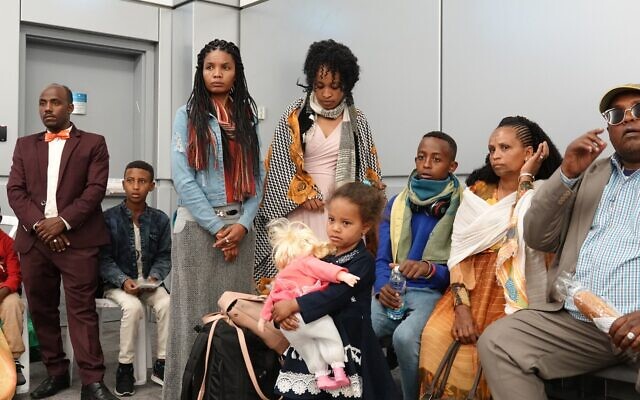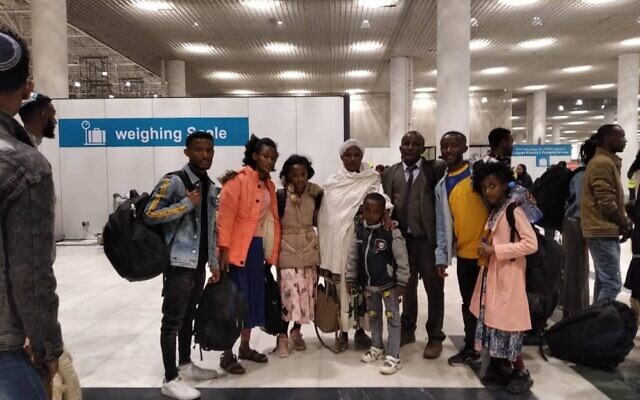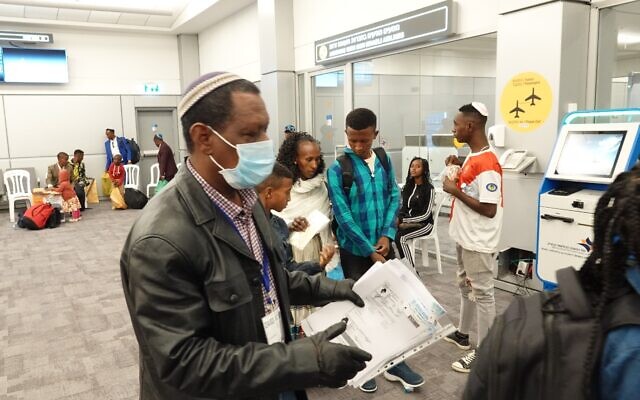Times of Israel || Hours before Ethiopia officially closed its land borders to prevent further coronavirus spread, a group of 14 Ethiopian families — totaling 72 new immigrants — landed at Ben-Gurion Airport before dawn on March 24. Their arrival comes a week after the Israeli government had initially postponed the naturalization of a total of 250 Ethiopians whose immigration was promised prior to the March 2 national elections.
An Aliyah and Absorption Ministry spokesperson said in an email last week that the Prime Minister’s Office had nixed flights due to the coronavirus crisis. The government reversed that decision this week and in a written statement announced that anyone holding a valid immigration visa was permitted to immigrate to Israel under the Law of Return.
“I was very sad last week when they stopped the aliyah [immigration],” said former Knesset member Avraham Neguise, who advocates on behalf of Ethiopian Israelis. “I am very happy for the immigrants, who are fulfilling their dream of many years, and for their families, who are waiting to see them.”
Despite his satisfaction with seeing the first arrivals, Ethiopia-born Neguise, who served as chair of the Knesset’s Immigration, Absorption and Diaspora Affairs committee from 2015 to 2019, protested the fact that the latest airlift did not include anyone over the age of 60.
“I am glad the [Israeli government] ministers changed their mind and renewed the immigration from Ethiopia,” Neguise told The Times of Israel by phone. “However, my joy is not complete because of the policy of discriminating against those who are age 60 or above who were left behind.”
“This policy is not acceptable,” he said. “They, too, must be brought to Israel to fulfill their dream of returning to Zion, the Jewish homeland. No matter whether there is the coronavirus or not, I appeal to the government of Israel to reconsider its policy of age discrimination.”

In contrast, Neguise pointed to a group of North American immigrants who arrived in Israel last week. At that time, Nefesh B’Nefesh confirmed the new arrivals from the United States ranged in age from nine months to 73 years.
“As the representative of world Jewry, the Jewish Agency is responsible for bringing Jews from the four corners of the Earth in cooperation with the State of Israel,” Neguise said. “If this [ageist] policy was not implemented for other countries, such as America, why is this policy implemented for the Ethiopian immigration?”
Asked about possibly ageist policies, a Population Authority spokesperson said the government sets the criteria for new immigrants. In addition, a Jewish Agency spokesperson stated that immigrants enter in order of the approval of their applications.

The Ethiopian immigrants are first-degree relatives of Beta Israel members from Gondar and Addis Adaba already settled in Israel, Neguise said.
They are members of the Falash Mura community, Ethiopians whose Jewish ancestors converted to Christianity generations ago, often under social, financial or political pressure. Approximately 8,000 Ethiopians with close relatives in Israel are seeking to immigrate. The Interior Ministry does not consider them Jewish, so their immigration is excluded under the Law of Return and requires special consideration, according to a Jewish Agency spokesperson.
“Since the beginning of March, [a total of] 961 immigrants arrived following Health Ministry quarantine guidelines,” said a March 24 statement issued by Aliyah and Absorption Minister (Res. Maj. Gen.) Yoav Gallant.
“The State of Israel is the home of every Jew. Even in these days, we are continuing absorption in compliance with the Health Ministry,” Gallant said. “I am happy and proud that we were able to… gradually airlift the remaining Falash Mura and unite them with their families in Israel… Even during the coronavirus, immigrants are welcome to Israel.”
Their arrival follows the government’s decision on February 9 approving the immigration of 398 Ethiopian immigrants, including 43 who arrived late February and Tuesday’s 72.

During the isolation period, the immigrants are quarantined in a repurposed youth hostel and are accompanied by dedicated Jewish Agency staff. After the 14-day period, they will be integrated as is customary in absorption centers in Israel, according to Gallant’s office.
“Following the outbreak of the coronavirus crisis, the Jewish Agency’s aliyah operation is functioning in emergency mode… so as to be able to best receive all new olim [immigrants] and help them get settled in the most effective manner possible, in accordance with all government instructions,” a Jewish Agency spokesperson told The Times of Israel in an email.
The new immigrants’ journey began with a 12-hour bus ride from the northern city of Gondar to Addis Adaba. Their flight departed shortly before midnight Monday and arrived in Israel at 3 a.m.
The Jewish Agency confirmed the two remaining groups of Ethiopian Jews previously approved to arrive March 25 and 31 will eventually be brought to Israel at an undetermined date.

Flight costs were covered by the International Christian Embassy Jerusalem, spokesperson David Parsons told The Times of Israel by phone. ICEJ is also donating gift baskets of Passover food, games, learning materials and other items. Ethiopian immigration is also supported by the Jewish Federations of North America, Keren Hayesod-UIA and friends of Israel from around the world, according to a Jewish Agency spokesperson.

“We are working within the rules set by the Health Ministry to help Israelis as much as we can in this troubling time confronting the whole world,” said ICEJ president Jürgen Bühler. “We know it is in difficult moments like these when our efforts to bless and comfort Israel count the most.”
Since the start of the COVID-19 crisis at the beginning of March, 800 immigrants have arrived from the US, Russia, Brazil, Argentina, France, the UK, Ukraine, South Africa, Australia and other countries, the Jewish Agency said. Over the coming weeks, until the start of Passover April 8, the Jewish Agency is preparing to receive another 250 immigrants from around the world.

























